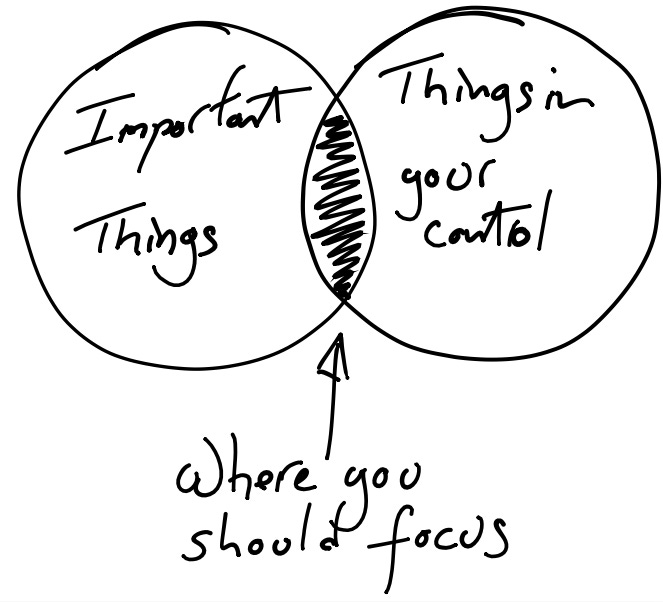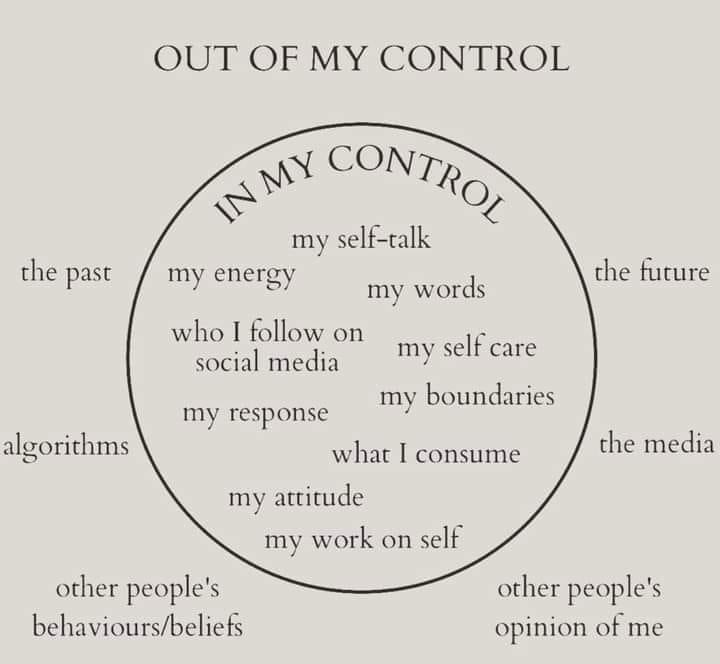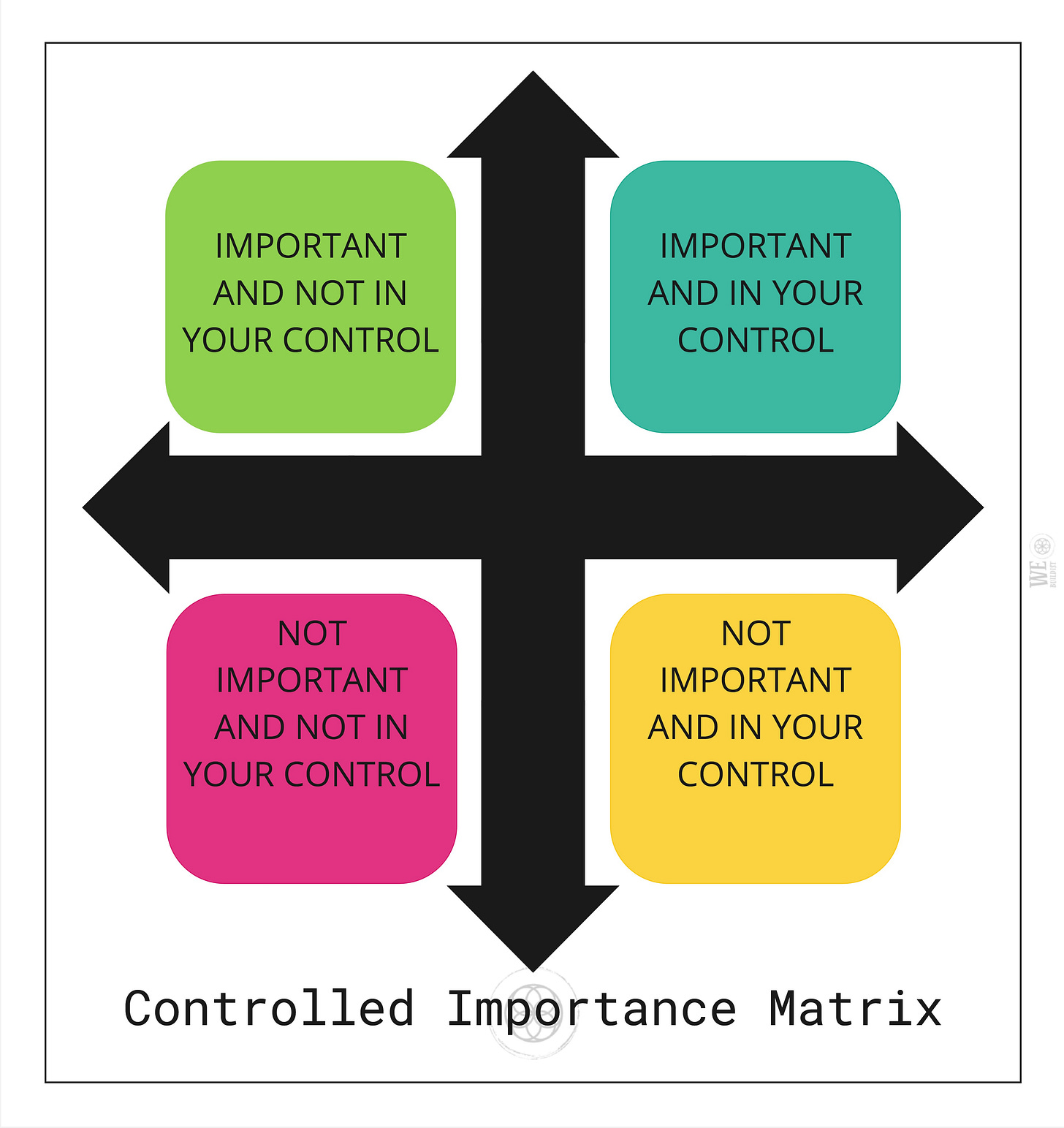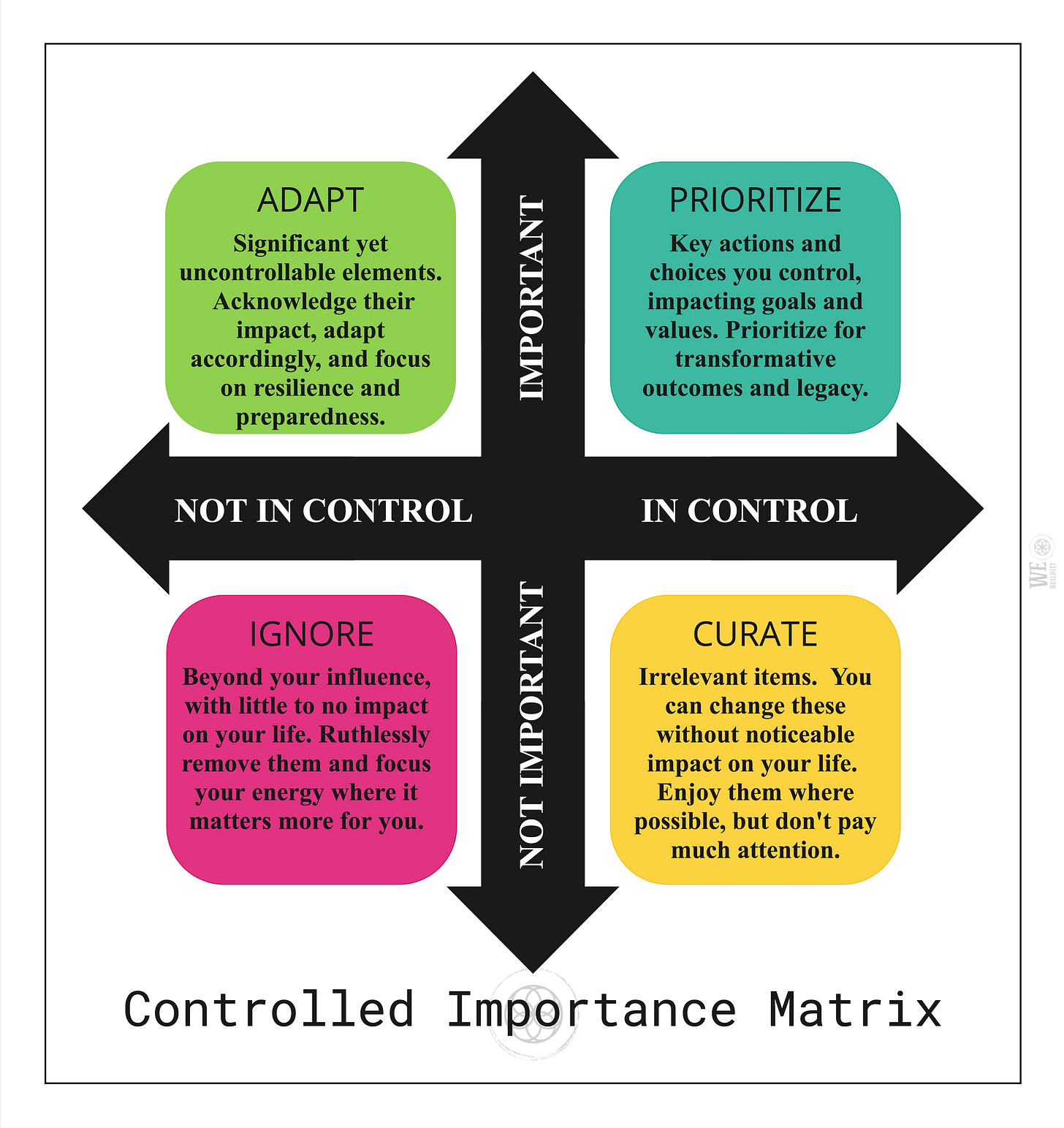Thanks for coming here, I hope you enjoy this article. Before you start reading, if you can click the ❤️ button on this post so that other people can discover it on Substack, it really makes a big difference. And share it. Thank you.
Everything is out of your control, slipping away from you - the election, that driver in front of you, your health, social media, someone's opinion of you, that person that never called you back.
Or do you find yourself focusing on the most insignificant things, all the while the really important things slip away? A few hours on TikTok watching silly dances, that weekly phone screentime report slowy creeping up, but less and less time spent with friends, family, or quiet time with yourself and your thoughts?
Thinking about the vastness and space and time - the far reaching future - can leave me feeling like I am insignificant - small. Tiny. A spec. Nothing of significance, here just to be forgotten.
It's in those moments I find it helpful to remember that most of life is out of my control, and in reality, there are very few things that I do control.
Strangely, this makes me feel better.
Stick with me here. I reckon there's a freedom is realizing we can't control most things in life. A freedom that allows us to focus on what we can control, and what's important to us.
When we can understand what we can actually control, and keep that in the forefront of our minds, then we can see life for what it really is - a giant out of fucking control wave where we just need to surf a part of it. If we fight, paddle the wrong way, stand at the wrong time, we don't surf - we fall under the enormity of it all.
It also allows us to respond to events in a healthy way, in fact controlling some part of the outcome. How we react to events affects us now, our future selves, and those around us. In short, tapping into Chip Conley's idea of Emotional Equations:
Outcome = Event X Response
If the event is a thing that happens, then the only way to change the outcome is to change the response. i.e. what is in your control is your response, and that response to an event modifies the outcome. Healthier Response = Better Outcome.
Simple math. Hard to implement.
Tying this back to the consideration of legacy, or of the infinite game -> everything we do, everything say, has an impact. On ourselves, on others, on our communities, and on people in the future. It's up to us to learn to act in the most healthy way possible, leaving the most positive impact in our wakes.
I have been thinking about this quite a bit lately, converging two different mental models that have played a large part in my life over the last few years. The first being the classic Eisenhower matrix, helping us to determine what is urgent/important, and the second being the stoic dichotomy of control, helping us see what is and is not in our control.
I think there's value in merging these tools together. Imagine a simple mental tool where you can take moments in life and very simply understand how much mental space and effort they should occupy in your life? To me, that's freedom. Maybe you'll find freedom in this too. What we are going to try to do Is identify the intersection of important things and things in our control.

How do we know what matters? What should we focus on? What is in our control, and what is not? What matters the most in our short time here, in these small lives we have? This tool should help - it helped me.
Let's dive in.
Understanding What We Can Control
“The chief task in life is simply this: to identify and separate matters so that I can say clearly to myself which are externals not under my control, and which have to do with the choices I actually control. Where then do I look for good and evil? Not to uncontrollable externals, but within myself to the choices that are my own . . .”
—Epictetus, Discourses, 2.5.4–5
Epictetus said it succinctly and clearly - if we can understand what is in our control versus what is not, then we can give situations the right amount of attention. Some say, and I agree, that this is the most important stoic lesson we can learn. If events are totally out of our control, there's no use worrying about them - they will happen regardless - we just need to respond to them in a healthy manner, thereby creating the best outcome possible for ourselves. We can’t make it rain when it’s sunny, the moon full when it’s not, someone like us who does not, or bring someone back when they have died.
This ties directly into the concept of Locus of Control (Rotter, 1966) - essentially (as far as I understand it) that one believes their destiny is controlled by themselves or by external forces. To me, understand what part of your life you have control over allows you to focus on those things, and you can let go of the external drivers out of your control.
Stoics believe that there are only 2 things that are under our control as humans - namely 1/ our voluntary actions and 2/ how we think about things.
Everything else - bodily sensations, events, our emotions, the past, the future, gossip and what people think about us, our bodies (yes we can influence, but ultimately, our bodies are not ours for long) and the ultimate outcomes of our actions - are beyond our control.
As long as we can remember to not worry about those things out of our control then we should be more accepting of those events in our lives.
Simple concept, but not easy to implement.
"You shouldn't give circumstances the power to rouse anger, for they don't care at all" - Marcus Aurelius, Meditations, 7.38
But oh so critical. The times my actions resulted in regret were almost always, if not all, caused by emotional responses, responses I could have controlled if I had learned how to. Or when I tried to control those things I could not - the external.
The Importance of Important things
The second model that will help give some more background (and probably serve many readers) is the Eisenhower matrix, also know as the Importance/Urgency matrix. I use it at work to help prioritize work and manage my time and attention. It divides tasks into one of four quadrants:
Urgent and Important: These are tasks that need immediate attention and are critical for your goals or work. They are often tied to important deadlines.
Important but Not Urgent: These tasks are important for long-term success and fulfillment but do not have an immediate deadline. Focusing on these can help prevent future emergencies, contribute to important projects, and promote personal growth.
Urgent but Not Important: These tasks require immediate attention but are not necessarily important for achieving your long-term goals. They often involve dealing with other people's priorities.
Neither Urgent nor Important: These activities are neither important to your long-term goals nor urgent. They are typically considered distractions and should be minimized or eliminated.
Here's a handy visual of this matrix for you to use in your life:
Stoicism’s dichotomy of control teaches us to discern between what we can and cannot control. The Eisenhower Matrix is a simple method for sorting tasks by urgency and importance.
Why do I care about knowing what is and isn’t important? Because I find that there’s so much information in the world, so much data, so many opinions, so many things going on… if I consider all of them, all the time, I suffer from information overload. If I can parse out what is important then I can give the right amount of attention to it. Because when I say yes to something, when I pay attention to something, I automatically say No to other things. That’s just a fact of our limited existence - there’s only so much we can pay attention to. The more we can calibrate the amount of attention to important and non-important things, then presumably, the more we can live into our true selves and be caused for change in the world around us.
Now we are ready to merge these two tools - The Dichotomy of Control and the Eisenhower matrix - into one: the Controlled Importance grid. This can help me, you, us, focus on what counts:
The Controlled Importance Matrix
And with that, dear reader, feast your eyes on this beauty: The Controlled Importance matrix. Although I found this novel and revolutionary, it is highly likely someone else has thought of this before.
Important and under your control
Items in this category encompass the key personal actions, choices, and behaviors that you can directly influence and that play a significant role in achieving your goals and living according to your values. This might include your work ethic, the way you treat others, your commitment to personal development, how you react to situations, health practices, and financial planning. These are areas where your direct intervention can lead to significant improvements in your quality of life, contribute to your personal and professional growth, and help you shape the legacy you wish to leave. They are the strategic choices that, when managed wisely, can lead to substantial and fulfilling outcomes.
You want to prioritize these things. Measure them, track them, improve them.
Important and not under your control
Items in this category refer to significant factors that impact your life but are beyond your direct influence. These could include the state of the economy, weather conditions, global warming, or the actions of powerful people. While you can't control these factors, they are relevant to your life—potentially affecting your financial stability, daily activities, or societal wellbeing. Recognizing these elements is crucial as it allows you to develop strategies for adaptation and resilience, such as creating contingency plans or learning coping mechanisms to deal with the outcomes they may present.
Know about and adapt to them, but don’t worry about them much - there’s nothing you can do.
Not important and under your control
Activities and choices that fall into this category are typically trivial preferences or routine tasks that, while within your ability to decide or act upon, do not have significant consequences for your personal growth, broader goals, or happiness. They could include choosing which TV shows to watch, which brand of shoes to wear, which sports teams to follow, dyeing your hair, or any number of busy work items that just do not matter. These decisions may shape your daily routine or provide leisure, but they are unlikely to affect the course of your life or legacy in any substantial way.
These details are irrelevant, curate them to reduce the mental load of minor decisions and concentrate your energies on areas that are truly impactful. Or just use them as sources of simple pleasure.
Not important and not under your control
This category is for external factors that have little to no direct impact on one's life and do not contribute to one's long-term goals or well-being. They are events or opinions that are inconsequential to personal or professional development. An example could be a distant acquaintance's opinion on a matter that doesn't pertain to your interests or the outcome of a TV show you don't watch. These are elements of life that you neither have sway over nor have significance in your personal narrative or legacy.
Pay no attention to them whatsoever. To ignore them will minimize unnecessary stress and help you keep focus on what truly matters.
How to use it?
Simple really. Print the Matrix (printable PDF directly below). And what I have been toying with is, at the end of my day, writing major events or thoughts of the day on post it notes, and then sticking them into the appropriate quadrant. This allows me to have a quick check-in and ensure that my mind isn’t being taken up by anything that it shouldn’t be taken up by. Most importantly, focus on what is important and I can control.
Reaction, Perception, and Influence
How we react in life, how we react to events act as windows into our personality and priorities and leaves lasting impressions. Lasting impressions on others. On our communities. On ourselves.
They reveal our emotional landscape and how we navigate challenges, thereby informing others about our resilience, values, and what truly matters to us. This understanding fosters deeper connections and shapes how we're perceived and relied upon within our relationships and communities.
In an increasingly complex world of unimportant noise littered with things we cannot possibly control, learning to understand what we can control and are truly important to us gives us a superpower - one where we can silently march towards a vision of life that makes a difference, and allows us to be at peace with what is happening around us.
The Controlled Importance Matrix offers a framework for focusing on what truly matters. By categorizing aspects of our lives based on their importance and our control over them, we're empowered to invest our precious resources - time and mental effort - wisely.
This deliberate attention to impactful actions within our control is fundamental in building a meaningful legacy, ensuring our efforts contribute to lasting, positive change in the world and in the lives of those who follow.
I hope you find it useful.
Thanks so very much for reading. I know this was a big one. If you loved this, please share it with your friends, family, enemies and strangers. Click the ❤️ button on this post so that other people can discover it on Substack. Read the other things I wrote. Oh and I should be asking you to subscribe if you haven’t. Please do these things, they all mean a lot.




